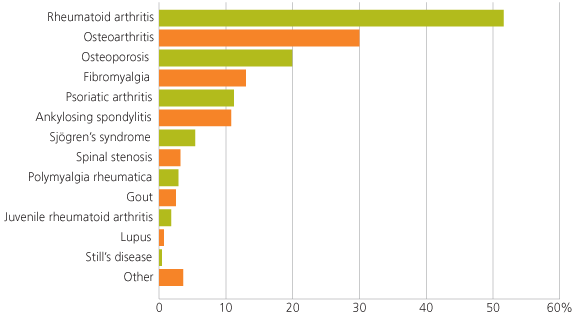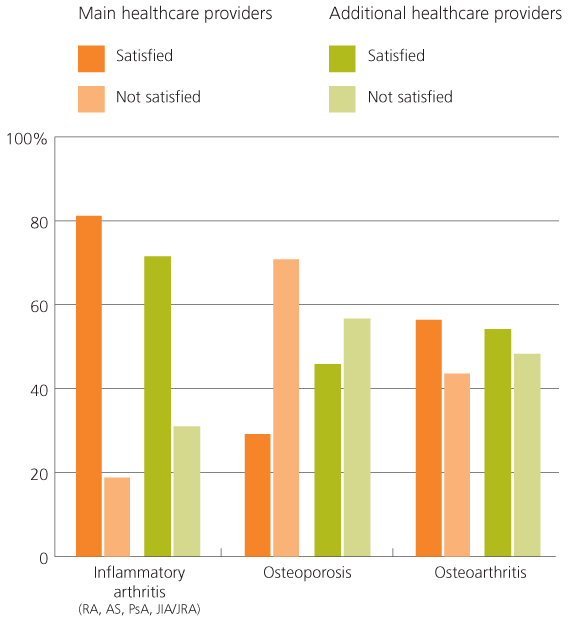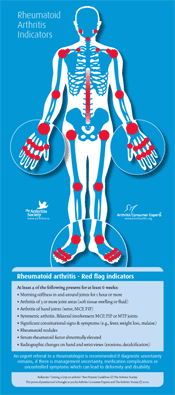In this issue
Listening to you Arthritis Consumer Experts (ACE)
JointHealth™ insight Published December 2010
Access to healthcare professionals
the JointHealth™ survey results are in
In spring 2010, Arthritis Consumer Experts (ACE) ran a survey to seek our members' and JointHealth™ subscribers' views on their satisfaction with their access to healthcare professionals. We are pleased to report the survey findings in this online issue of JointHealth™ monthly.
Purpose of the survey
The purpose of the ACE "Access to Healthcare Professionals" survey was to gage our members' and subscribers' level of satisfaction with the healthcare they are receiving. In this special online edition of JointHealth™ monthly, we are responding to the results of the survey by providing tips on finding a family doctor and getting a referral to a rheumatologist and by giving suggestions for alternative healthcare providers. In a future issue, we will discuss ways to get the most out of your appointment with your doctor.
What did the survey ask?
The survey asked people how long they had their form of arthritis before seeing a rheumatologist or receiving a diagnosis, what type of healthcare practitioners were mainly responsible for their care, what additional healthcare providers they had, and how satisfied they were with the care they received.
Who responded to the survey?
Nearly 42% of the respondents had more than one form of arthritis, with the highest proportion having 2 or 3 types. A small number had as many as 5 or 6 disease-types. Therefore, our results do not add up to 100 percent because some people have been counted more than once due to having multiple diseases. Roughly half of the respondents to the survey had rheumatoid arthritis and just over 23% had other inflammatory forms of arthritis (juvenile idiopathic arthritis, psoriatic arthritis, and ankylosing spondylitis). Around 30% had osteoarthritis and 20% had osteoporosis. People with gout, polymyalgia rheumatica, Still's disease, spinal stenosis, and lupus represented 9.7% of the respondents. Three percent either did not have a diagnosis yet or completed the survey on someone else's behalf.
Our highest number of respondents came from British Columbia (37.3%) and Ontario (25.8%), were female (84.3%), had rheumatoid arthritis (51.6%), were born in the 1940s (30.0%) or 1950s (31.4%), and lived in a city with at least 2 hospitals (64.7%).
Participants by disease type

What were the survey results?
Overall, most survey respondents were happy with their healthcare, with 70% declaring they were either "well" or "very well" cared for by the person mainly responsible for their healthcare, which were chiefly rheumatologists. Generally, the highest levels of satisfaction were felt by those from Quebec, British Columbia, or Ontario, living with an inflammatory form of arthritis, and having a rheumatologist as one of their healthcare providers. People were most likely to be satisfied with their healthcare if they were diagnosed within 3 months of disease onset. High satisfaction levels were also associated with living in a city with at least one hospital.
It is interesting to note, that for osteoporosis, levels of satisfaction with healthcare providers were lower than for those with osteoarthritis or an inflammatory form of arthritis (rheumatoid arthritis, ankylosing spondylitis, psoriatic arthritis, and juvenile idiopathic arthritis). The survey did not ask the question why people were not satisfied with their care, but one possible explanation is that with osteoporosis, often people go many years without knowing that their bones are thinning because there are no symptoms. Therefore, they may not be receiving early care for the disease.
Early diagnosis has been shown to lead to better health outcomes. Better health outcomes may lead to greater satisfaction with healthcare. The tendency for osteoporosis to be discovered after a fracture has occurred, and therefore at an advanced stage, could be the reason people with the disease are less satisfied. To learn more about osteoporosis, please go to the website for Osteoporosis Canada.
Most of the participants (82.9%) were referred to a rheumatologist and were in their care, of those 80.8% were 'well' or 'very well' satisfied with the care by their main healthcare provider. Only 3.1% had been referred to a rheumatologist, but have not had an appointment yet. Just 1.2% had doctors that wanted to refer them to a rheumatologist, but none were available. For 13.2% of respondents, their doctors had not mentioned a need for a referral.
However, more than half of respondents had their form of arthritis at least one year before seeing a rheumatologist, but only about one-third saw a rheumatologist within 6 months of the onset of their disease. Given how critical it is to receive a diagnosis early to minimize, or even avoid, long term deformity and disability, much needs to be done to improve access to arthritis treatment and care in Canada.
Levels of satisfaction, by disease-type, with main and additional healthcare providers

Understanding the results
We were very pleased to learn that our members and subscribers, with the exception of those living with osteoporosis, are generally satisfied with their healthcare team. The individual feedback indicated that our members are proactive in communicating with their healthcare team, which we suspect improves the quality of support they receive. JointHealth™ programs are designed to help people with arthritis take control of their disease and take action in their healthcare. This survey shows that these programs are working! However, we remain concerned about those with osteoporosis and people with arthritis who are not our members as they may not have the information or the resources to have their arthritis diagnosed, treated, and managed in a timely fashion.
The survey may not tell the whole story. Most of our respondents have an array of resources at their fingertips, such as a computer whereby they might have access to more arthritis information and research. No one lived in a small community that was far from a hospital and the participants mainly came from provinces that rank well on our Report Card on provincial formulary reimbursement listings for biologic response modifiers – that is, the people who filled out this survey most likely have the best access to healthcare in Canada, so do not necessarily represent an accurate picture of everyone's experience in Canada. If the survey were completed by a larger group of people living with arthritis, outside of the ACE membership and subscriber-ship, a serious problem with healthcare delivery for people with arthritis would likely emerge.
Roadmap to getting the care you need

Finding a Family Doctor
The first step to managing your health is finding a family doctor. If you do not already have a family doctor, there are a variety of ways to find one:
You may have to modify your expectations when looking for a family physician. Finding a family doctor who has an office one kilometre from your house, who is of a specific gender with 20 years experience, and who speaks a specific language, may not be possible. The most important aspect to look for is a family doctor you feel comfortable talking to.
Getting a referral to a rheumatologist
Obtaining a referral to see a rheumatologist can be challenging. One of the main reasons is that family physicians do not receive enough education to recognize the signs and symptoms of the over 100 types of arthritis and related diseases. Out of four years of medical school training, they only receive about 17 hours of training.
To assist primary care professionals with the diagnosis and management of arthritis, Arthritis Consumer Experts and The Arthritis Society worked together to develop a "point-of-practice" arthritis tool. The content for this tool is from the evidence-based Best Practice Guidelines for arthritis developed by and for primary care providers as part of the "Getting a Grip on arthritis" program (© The Arthritis Society). If you think you need to be referred to an arthritis specialist (rheumatologist), but your family doctor is unsure, you may find it helpful to bring this tool with you to your next appointment.
The tool is a quick reference guide that helps your doctor determine if you have any of the indicators of rheumatoid arthritis or osteoarthritis. If you have certain red flag indicators as shown on the tool, your doctor may feel more confident about referring you to a rheumatologist. The tool is available at the Arthritis is Cured! (if you want it) website.
Or, if you prefer to have one mailed to you, please contact us at info@arthritisiscured.org
If your family doctor does not know who to refer you to, you can request a specific rheumatologist. How do you find out who you should ask for? The same techniques for finding a family doctor can be applied to finding a specialist.
Ask your friends and family if they have a rheumatologist they feel enthusiastic about recommending. Go to the College of Physicians and Surgeons website for each province and search for doctors by specialty in your community. If you are unable to find a rheumatologist in your community, widen your geographic search to neighbouring communities.
Join an arthritis organization or support group and go to meetings. When you meet other people with arthritis, ask them if they know a rheumatologist they would recommend.
If your doctor cannot refer you to a specialist in your community and asking friends, family, and other contacts does not yield a result, you may have to ask your doctor to refer you to a specialist in a major urban centre like Vancouver, Calgary, or Toronto.
Allied healthcare professionals (physiotherapists, occupational therapists, nurse practitioners)
Unfortunately, in Canada, there is a shortage of family doctors and there are only 350 rheumatologists to serve the entire country. That means that for every rheumatologist, there are close to 13,000 people living with arthritis who require their care. If you are struggling to find someone to provide primary care, nurse practitioners, physiotherapists or occupational therapists trained in arthritis are a good alternative. Their role in your healthcare could prove invaluable.
Nurses can help you through the disease process, explain how the medical system works and help you get the most out of it, they can inform you about resources pertinent to your disease type, and finally, they can provide direct care that focuses on health promotion, treatment, and management of your arthritis.
Physiotherapists, some of whom specialize in arthritis, can do an assessment of your joints' function and help you determine the best exercises to manage your disease. Conditions they treat include osteoarthritis, osteoporosis, and fibromyalgia. In addition to helping you manage your disease, they can refer you to other healthcare professionals and to arthritis resources in your community
Occupational therapists that specialize in arthritis management can show you how to protect your joints in your daily activities. They may help you modify your home and work environments to accommodate your disease. Furthermore, they may provide or recommend splints, braces, and other assistive devices to help you with driving, bathing, shopping, housecleaning, and meal preparation. Namely they can help you to improve your mobility and reduce your dependence on others.
For more information about these and other allied healthcare professionals, please visit The Arthritis Society's website for the section on "Meeting the Treatment Team".
Listening to you
We hope you find this information of use. Please tell us what you think by writing to us or emailing us at info@jointhealth.org. Through your ongoing and active participation, ACE can make its work more relevant to all Canadians living with arthritis.
Update your email or postal address
Please let us know of any changes by contacting ACE at info@jointhealth.org. This will ensure that you continue to receive your free email or print copy of JointHealth™ monthly.
Arthritis Consumer Experts (ACE)
Who We Are
Arthritis Consumer Experts (ACE) provides research-based education, advocacy training, advocacy leadership and information to Canadians with arthritis. We help empower people living with all forms of arthritis to take control of their disease and to take action in healthcare and research decision making. ACE activities are guided by its members and led by people with arthritis, leading medical professionals and the ACE Advisory Board. To learn more about ACE, visit: www.jointhealth.org
Acknowledgements
Over the past 12 months, ACE received unrestricted grants-in-aid from: Abbott Laboratories Ltd., Amgen Canada, Arthritis Research Centre of Canada, Bristol-Myers Squibb Canada, Canadian Institutes of Health Research, GlaxoSmithKline, Hoffman-La Roche Canada Ltd., Merck & Co. Canada, Pfizer Canada, Sanofi-aventis Canada Inc., and UCB Canada Inc. ACE also receives unsolicited donations from its community members (people with arthritis) across Canada.
ACE thanks these private and public organizations and individuals.
Disclaimer
The material contained on this website is provided for general information only. This website should not be relied on to suggest a course of treatment for a particular individual or as a substitute for consultation with qualified health professionals who are familiar with your individual medical needs. Should you have any healthcare related questions, you should contact your physician. You should never disregard medical advice or delay in seeking it because of something you have read on this or any website.
This site may provide links to other Internet sites only for the convenience of World Wide Web users. ACE is not responsible for the availability or content of these external sites, nor does ACE endorse, warrant or guarantee the products, services or information described or offered at these other Internet sites.
Although the information presented on this website is believed to be accurate at the time it is posted, this website could include inaccuracies, typographical errors or out-of-date information. This website may be changed at any time without prior notice.
Access to healthcare professionals
the JointHealth™ survey results are in
In spring 2010, Arthritis Consumer Experts (ACE) ran a survey to seek our members' and JointHealth™ subscribers' views on their satisfaction with their access to healthcare professionals. We are pleased to report the survey findings in this online issue of JointHealth™ monthly.
Purpose of the survey
The purpose of the ACE "Access to Healthcare Professionals" survey was to gage our members' and subscribers' level of satisfaction with the healthcare they are receiving. In this special online edition of JointHealth™ monthly, we are responding to the results of the survey by providing tips on finding a family doctor and getting a referral to a rheumatologist and by giving suggestions for alternative healthcare providers. In a future issue, we will discuss ways to get the most out of your appointment with your doctor.
What did the survey ask?
The survey asked people how long they had their form of arthritis before seeing a rheumatologist or receiving a diagnosis, what type of healthcare practitioners were mainly responsible for their care, what additional healthcare providers they had, and how satisfied they were with the care they received.
Who responded to the survey?
Nearly 42% of the respondents had more than one form of arthritis, with the highest proportion having 2 or 3 types. A small number had as many as 5 or 6 disease-types. Therefore, our results do not add up to 100 percent because some people have been counted more than once due to having multiple diseases. Roughly half of the respondents to the survey had rheumatoid arthritis and just over 23% had other inflammatory forms of arthritis (juvenile idiopathic arthritis, psoriatic arthritis, and ankylosing spondylitis). Around 30% had osteoarthritis and 20% had osteoporosis. People with gout, polymyalgia rheumatica, Still's disease, spinal stenosis, and lupus represented 9.7% of the respondents. Three percent either did not have a diagnosis yet or completed the survey on someone else's behalf.
Our highest number of respondents came from British Columbia (37.3%) and Ontario (25.8%), were female (84.3%), had rheumatoid arthritis (51.6%), were born in the 1940s (30.0%) or 1950s (31.4%), and lived in a city with at least 2 hospitals (64.7%).
Participants by disease type

What were the survey results?
Overall, most survey respondents were happy with their healthcare, with 70% declaring they were either "well" or "very well" cared for by the person mainly responsible for their healthcare, which were chiefly rheumatologists. Generally, the highest levels of satisfaction were felt by those from Quebec, British Columbia, or Ontario, living with an inflammatory form of arthritis, and having a rheumatologist as one of their healthcare providers. People were most likely to be satisfied with their healthcare if they were diagnosed within 3 months of disease onset. High satisfaction levels were also associated with living in a city with at least one hospital.
It is interesting to note, that for osteoporosis, levels of satisfaction with healthcare providers were lower than for those with osteoarthritis or an inflammatory form of arthritis (rheumatoid arthritis, ankylosing spondylitis, psoriatic arthritis, and juvenile idiopathic arthritis). The survey did not ask the question why people were not satisfied with their care, but one possible explanation is that with osteoporosis, often people go many years without knowing that their bones are thinning because there are no symptoms. Therefore, they may not be receiving early care for the disease.
Early diagnosis has been shown to lead to better health outcomes. Better health outcomes may lead to greater satisfaction with healthcare. The tendency for osteoporosis to be discovered after a fracture has occurred, and therefore at an advanced stage, could be the reason people with the disease are less satisfied. To learn more about osteoporosis, please go to the website for Osteoporosis Canada.
Most of the participants (82.9%) were referred to a rheumatologist and were in their care, of those 80.8% were 'well' or 'very well' satisfied with the care by their main healthcare provider. Only 3.1% had been referred to a rheumatologist, but have not had an appointment yet. Just 1.2% had doctors that wanted to refer them to a rheumatologist, but none were available. For 13.2% of respondents, their doctors had not mentioned a need for a referral.
However, more than half of respondents had their form of arthritis at least one year before seeing a rheumatologist, but only about one-third saw a rheumatologist within 6 months of the onset of their disease. Given how critical it is to receive a diagnosis early to minimize, or even avoid, long term deformity and disability, much needs to be done to improve access to arthritis treatment and care in Canada.
Levels of satisfaction, by disease-type, with main and additional healthcare providers

Understanding the results
We were very pleased to learn that our members and subscribers, with the exception of those living with osteoporosis, are generally satisfied with their healthcare team. The individual feedback indicated that our members are proactive in communicating with their healthcare team, which we suspect improves the quality of support they receive. JointHealth™ programs are designed to help people with arthritis take control of their disease and take action in their healthcare. This survey shows that these programs are working! However, we remain concerned about those with osteoporosis and people with arthritis who are not our members as they may not have the information or the resources to have their arthritis diagnosed, treated, and managed in a timely fashion.
The survey may not tell the whole story. Most of our respondents have an array of resources at their fingertips, such as a computer whereby they might have access to more arthritis information and research. No one lived in a small community that was far from a hospital and the participants mainly came from provinces that rank well on our Report Card on provincial formulary reimbursement listings for biologic response modifiers – that is, the people who filled out this survey most likely have the best access to healthcare in Canada, so do not necessarily represent an accurate picture of everyone's experience in Canada. If the survey were completed by a larger group of people living with arthritis, outside of the ACE membership and subscriber-ship, a serious problem with healthcare delivery for people with arthritis would likely emerge.
Roadmap to getting the care you need

Finding a Family Doctor
The first step to managing your health is finding a family doctor. If you do not already have a family doctor, there are a variety of ways to find one:
- You may find that your local walk-in clinic will provide a list of general practitioners taking new patients. Alternatively, if you have had one or more appointments with a doctor at your local clinic and feel you would want them as a family doctor, ask them if they have a family practice and if so, are accepting new patients.
- Ask for a referral from your old doctor, especially if you have recently moved to a new community.
- Ask your friends and family if they can make a recommendation. If you like what you hear, then call their doctor and ask the receptionist if the doctor is accepting new patients. Be sure to tell the receptionist that you were referred by a current patient.
- Look for a list of doctors accepting new patients on the website of the College of Physicians and Surgeons in your province. The "find a doctor" service of the College of Physicians and Surgeons allows you to customize your search for a family doctor by gender, location, and language of service. For example, in BC, Alberta, and Ontario this service is located at:
- British Columbia: www.cpsbc.ca/node/216
- Alberta: www.cpsa.ab.ca/PhysicianSearch/AdvancedSearch.aspx
- Ontario: www.cpso.on.ca/docsearch
You may have to modify your expectations when looking for a family physician. Finding a family doctor who has an office one kilometre from your house, who is of a specific gender with 20 years experience, and who speaks a specific language, may not be possible. The most important aspect to look for is a family doctor you feel comfortable talking to.
Getting a referral to a rheumatologist
Obtaining a referral to see a rheumatologist can be challenging. One of the main reasons is that family physicians do not receive enough education to recognize the signs and symptoms of the over 100 types of arthritis and related diseases. Out of four years of medical school training, they only receive about 17 hours of training.
To assist primary care professionals with the diagnosis and management of arthritis, Arthritis Consumer Experts and The Arthritis Society worked together to develop a "point-of-practice" arthritis tool. The content for this tool is from the evidence-based Best Practice Guidelines for arthritis developed by and for primary care providers as part of the "Getting a Grip on arthritis" program (© The Arthritis Society). If you think you need to be referred to an arthritis specialist (rheumatologist), but your family doctor is unsure, you may find it helpful to bring this tool with you to your next appointment.
The tool is a quick reference guide that helps your doctor determine if you have any of the indicators of rheumatoid arthritis or osteoarthritis. If you have certain red flag indicators as shown on the tool, your doctor may feel more confident about referring you to a rheumatologist. The tool is available at the Arthritis is Cured! (if you want it) website.
Or, if you prefer to have one mailed to you, please contact us at info@arthritisiscured.org
If your family doctor does not know who to refer you to, you can request a specific rheumatologist. How do you find out who you should ask for? The same techniques for finding a family doctor can be applied to finding a specialist.
Ask your friends and family if they have a rheumatologist they feel enthusiastic about recommending. Go to the College of Physicians and Surgeons website for each province and search for doctors by specialty in your community. If you are unable to find a rheumatologist in your community, widen your geographic search to neighbouring communities.
Join an arthritis organization or support group and go to meetings. When you meet other people with arthritis, ask them if they know a rheumatologist they would recommend.
If your doctor cannot refer you to a specialist in your community and asking friends, family, and other contacts does not yield a result, you may have to ask your doctor to refer you to a specialist in a major urban centre like Vancouver, Calgary, or Toronto.
Allied healthcare professionals (physiotherapists, occupational therapists, nurse practitioners)
Unfortunately, in Canada, there is a shortage of family doctors and there are only 350 rheumatologists to serve the entire country. That means that for every rheumatologist, there are close to 13,000 people living with arthritis who require their care. If you are struggling to find someone to provide primary care, nurse practitioners, physiotherapists or occupational therapists trained in arthritis are a good alternative. Their role in your healthcare could prove invaluable.
Nurses can help you through the disease process, explain how the medical system works and help you get the most out of it, they can inform you about resources pertinent to your disease type, and finally, they can provide direct care that focuses on health promotion, treatment, and management of your arthritis.
Physiotherapists, some of whom specialize in arthritis, can do an assessment of your joints' function and help you determine the best exercises to manage your disease. Conditions they treat include osteoarthritis, osteoporosis, and fibromyalgia. In addition to helping you manage your disease, they can refer you to other healthcare professionals and to arthritis resources in your community
Occupational therapists that specialize in arthritis management can show you how to protect your joints in your daily activities. They may help you modify your home and work environments to accommodate your disease. Furthermore, they may provide or recommend splints, braces, and other assistive devices to help you with driving, bathing, shopping, housecleaning, and meal preparation. Namely they can help you to improve your mobility and reduce your dependence on others.
For more information about these and other allied healthcare professionals, please visit The Arthritis Society's website for the section on "Meeting the Treatment Team".
|
Definitions Primary healthcare provider: The person mainly responsible for managing your health and your disease, such as your family physician or arthritis specialist. Secondary healthcare provider: The person who provides a supportive role in managing your health, such as a nurse practitioner, occupational therapist, physiotherapist, nutritionist, etc. Rheumatologist: A doctor who specializes in treating systemic (whole body) forms of arthritis. |
Listening to you
We hope you find this information of use. Please tell us what you think by writing to us or emailing us at info@jointhealth.org. Through your ongoing and active participation, ACE can make its work more relevant to all Canadians living with arthritis.
Update your email or postal address
Please let us know of any changes by contacting ACE at info@jointhealth.org. This will ensure that you continue to receive your free email or print copy of JointHealth™ monthly.
Arthritis Consumer Experts (ACE)
Who We Are
Arthritis Consumer Experts (ACE) provides research-based education, advocacy training, advocacy leadership and information to Canadians with arthritis. We help empower people living with all forms of arthritis to take control of their disease and to take action in healthcare and research decision making. ACE activities are guided by its members and led by people with arthritis, leading medical professionals and the ACE Advisory Board. To learn more about ACE, visit: www.jointhealth.org
Acknowledgements
Over the past 12 months, ACE received unrestricted grants-in-aid from: Abbott Laboratories Ltd., Amgen Canada, Arthritis Research Centre of Canada, Bristol-Myers Squibb Canada, Canadian Institutes of Health Research, GlaxoSmithKline, Hoffman-La Roche Canada Ltd., Merck & Co. Canada, Pfizer Canada, Sanofi-aventis Canada Inc., and UCB Canada Inc. ACE also receives unsolicited donations from its community members (people with arthritis) across Canada.
ACE thanks these private and public organizations and individuals.
Disclaimer
The material contained on this website is provided for general information only. This website should not be relied on to suggest a course of treatment for a particular individual or as a substitute for consultation with qualified health professionals who are familiar with your individual medical needs. Should you have any healthcare related questions, you should contact your physician. You should never disregard medical advice or delay in seeking it because of something you have read on this or any website.
This site may provide links to other Internet sites only for the convenience of World Wide Web users. ACE is not responsible for the availability or content of these external sites, nor does ACE endorse, warrant or guarantee the products, services or information described or offered at these other Internet sites.
Although the information presented on this website is believed to be accurate at the time it is posted, this website could include inaccuracies, typographical errors or out-of-date information. This website may be changed at any time without prior notice.

